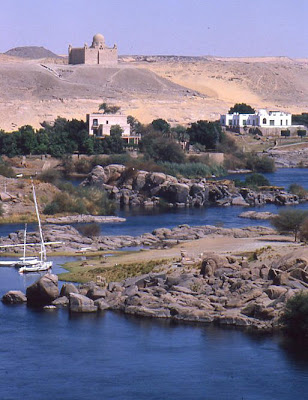
The Nile at Luxor
 The Nile at Aswan
The Nile at Aswan

Sunset over the Nile
In ancient times, the river was the quickest and easy way to travel between Upper and Lower Egypt, and it is still a significant thoroughfare for the transportation of goods within the country.

The graceful felucca is still a common sight on the river

Three feluccas at Aswan

A felucca boatman near Aswan
When you travel up or down the Nile, you cannot help be struck by the lushness of the vegetation on both sides of the river. And by the way the river has fostered human life along its banks for thousands of years.






However, you are also frequently reminded of the fact that most of Egypt is desert, and that the desert is constantly trying to take over the fields and farms which line the river. 

No comments:
Post a Comment